de-
(Latin: from, away from, off; down; wholly, entirely, utterly, complete; reverse the action of, undo; the negation or reversal of the notion expressed in the primary or root word)
Another reason someone might have dementophobia is because he or she has severe depressions, headaches, dizziness, or difficulty breathing.
2. Absence of merit; the quality of being inadequate or falling short of perfection.
3. A mark made against a person's record for a fault or for misconduct: The soldier received a demerit for his failure to do his assignment as ordered.
2. To eliminate the military character of a zone: All buildings and housing of the soldiers were removed to demilitarize the area.
3. To prohibit military forces or installations in an area: In order to demilitarize the section of the city, all bases, camps, headquarters, etc. of the armed forces were forbidden.
4. To replace military control with civilian control: To demilitarize the area, the politicians agreed on removing all armed forces and power in the area and having the city return to a normal civil life of people not connected with armed forces and services.
2. The loss, deprivation, or removal of minerals or mineral salts from the body; especially, through disease, as with the loss of calcium from bones or teeth.
3. Excessive elimination of mineral or inorganic salts; as in, pulmonary tuberculosis, cancer, and osteomalacia.
To demineralize or to withdraw and remove the mineral content of the fluid was important for more efficient applications in the clinic.
2. In law, the transfer of an estate by lease or will: James, the landlord, demised his property to his son, including his control over it.
3. The transfer of a ruler's authority by death or abdication: The crown was demised to the queen's heir, the prince, after she died.
4. Etymology: from about 1442, from Middle French (c.1400 to c.1600) demise, past participle of demettre, "to dismiss, to put away"; from des-, "away" (from Latin dis-) + Middle French mettre "to put"; from Latin mittere "to let go, to send".
It originally meant "the transfer of an estate by [means of a] will"; and the meaning was extended in 1754 to "death" because that's when the transfer happened.
The demise of "Dear"
Here is a change in common usage that offers a linguistic clue to a cultural change which has resulted from electronic mail (e-mail) usage.
This presentation is about the threatened abandonment of the symbolic embrace inherent in an old Teutonic word: Dear! The application of "Dear" came into existence about a thousand years ago meaning "honorable, worthy", and then it took on the sense of "esteemed, valued" and ultimately "beloved", gaining a sense of "high-priced" along the way.
Back in the time of the "quill pen", the word was used as a polite form of address in introducing a message to a friend or to a stranger and establishing status to a superior, an employee, or an equal.
Now, in the age of instant messaging and e-mail, the compressors of personal communication have been doing away with the word traditionally used in salutation. Instead of using Dear, the e-generation often starts off either with no greeting, the first name, Hello Name, Hi Name, etc.
Apparently, the internet is now considered to be an informal means of communication and so it is no longer necessary to use a particular form of greeting; as long as it isn't replaced with some form of rudeness.
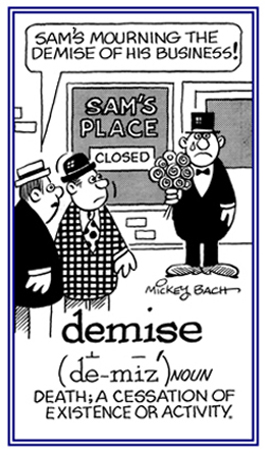
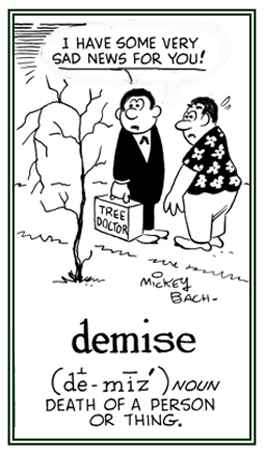
Go to this Word A Day Revisited Index
so you can see more of Mickey Bach's cartoons.
2. To give up or to relinquish an office, membership, authority, or the like; to resign.
3. To lay down, as an office; to resign.
4. To let fall; to depress.
5. To yield or submit; to humble; to lower; as, to demit one's self to humble duties.
2. Etymology: from French, the past participle of demoder, "to outmode" from dé-, "out" + mode, "fashion".
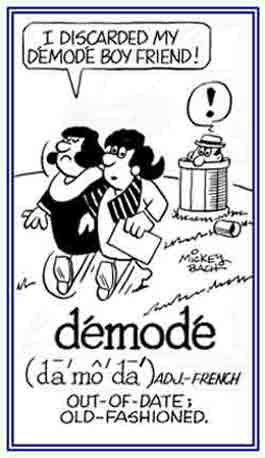
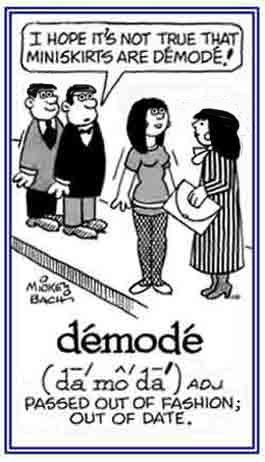
Go to this Word A Day Revisited Index
so you can see more of Mickey Bach's cartoons.
The old drug store was demolished to make a new parking lot.
2. To prove someone’s ideas as irrational or false: Patty’s mother couldn’t think of one argument that would demolish her daughter’s wish to go to the nightclub with her neighbor's son.3. To depress or to humiliate someone completely: Becky, who was 16, enjoyed doing many things with older people and this apparently demolished any desires to be with her teenage friends.
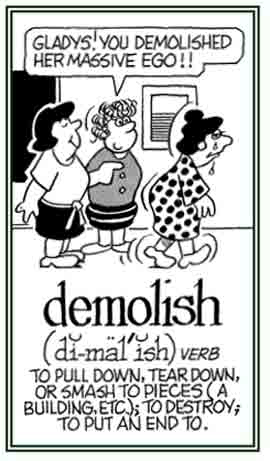
Go to this Word A Day Revisited Index
so you can see more of Mickey Bach's cartoons.
2. Capable of being shown to be true or to exist: There was demonstrable proof that the neighbor set fire to his house so he could collect the insurance.
The new administrator revealed the demonstrableness regarding the lack of concern that the previous administrator had for his staff.


